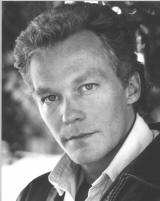 WOLVES
is described as a play about extinction and exploitation,
about the wilderness of the mind and body. Robinson
introduces four characters -- a wife, a husband, a
mechanic and a traveler -- all coming together at a lodge
in the middle of a rain storm.
WOLVES
is described as a play about extinction and exploitation,
about the wilderness of the mind and body. Robinson
introduces four characters -- a wife, a husband, a
mechanic and a traveler -- all coming together at a lodge
in the middle of a rain storm.
Morrison's participation started three years earlier when he was sitting at The Magic Theater in San Francisco watching a play called WOLVES. Ever since that time he wanted to direct it.
"The ending has never left me... the last speech," said James. "It's a Greek chorus effect and basically says 'everything is not dead -- we don't have to have guilt, and people do not need to limit themselves in any area.'"
Morrison said the play is extremely visual for him. The literal images of the wolves that author John Robinson depicts evoke memories from the time Morrison spent in Alaska.
"I remember when I was in high school there were people who used to shoot wolves from aircraft. I didn't believe in it then. I don't now."
And yet WOLVES is not about the plight of this mysterious
animal, nor is it an Alaskan wilderness story. There is
an element of folklore to it and certainly a great deal
of symbolism that could be associated with a wolf:
violence, instinctual urges and cunningness.
"It is not mainstream theater," said Nancy
Borgenicht, a board member of Salt Lake Acting Company,
the group that is producing the show. "I watched a
rehearsal, and it plays much different than it reads.
When you see it, it's like a campy mystery that is a
fairy tale and almost a love story. What's enticing about
it for me is that first of all it's the kind of theater
you don't get to see every day."
Calling himself an actor's director "because I am an
actor," Morrison said he has been working in a style
where he is pushing the actors to investigate their
possibilities and at the same time working towards
gaining their trust.
"I am basically a very instinctual person, and I go
with impulses. I think it is necessary when doing a play
to do it honestly and make it real. Simple blocking can
help, but it's important to let the actor explore the
character, to show the director new ways of looking at a
scene."
Morrison said when he first saw WOLVES he viewed it as a
"big, beautiful poem."
"I made a phone call to John Robinson and told him I
wanted to direct his play. I felt like I was talking to a
poet. He has a soft voice that sounds extremely kind. I
didn't think I should ask him what his play was about, so
we just agreed it was a very interesting poem. I feel
quite secure that when he sees it, it will be in the way
that he wrote it."
Though Robinson and his wife will come to Salt Lake City
from their San Francisco home April 10th to attend a
performance, Morrison won't be there. He will be in Los
Angeles auditioning for the Mark Taper Forum and somewhat
jokingly refers to this directorial assignment with
WOLVES as his "swan song."
"This is a play that I have a great deal of passion
for -- it has always said something to me and now, at
this time, says even more. It talks about a longing for
something that isn't or hasn't been fulfilled, and it
talks about a deep remorse for something you'll never
have again. I understand that clearer now."
"This play is a release for me... an expression of
my anger and resentment at death and yes, it is also a
play which is life... it is living. There are those
moments that make you aware of your vulnerability, and
that is important to me."
"That is why I am in theater. That is why the arts,
any of them, are so important. They serve as a creative
outlet."
Morrison said he choose to direct, not act in WOLVES
because "I couldn't express what I saw in the
overall play if I was acting in it. I do however identify
with Eric (the traveler who becomes stranded at the
lodge)."
"He is clinical and a somewhat sterile character,
and yet when he becomes the wolf he is a tender creature
who wants to take care of his family. Take a look around.
There is that balance. We are animals who have instincts,
and yet we are also sterile mechanical and clinical
characters." Synopsized from a review by Nancy Funk,
Staff Writer for the Tribune.

